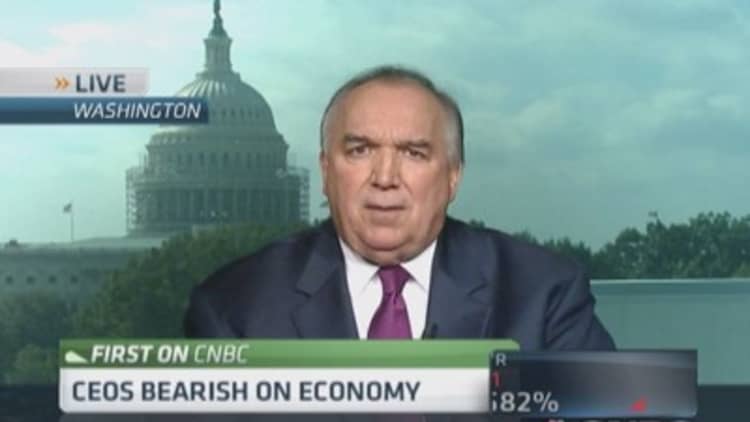
Corporate executives are scaling back plans for sales, capital spending and job creation this quarter, according to a the Business Roundtable (BRT) survey Tuesday, consistent with other indicators that have tempered growth expectations.
The group's Economic Outlook Index—a snapshot of CEO expectations for the next six months of sales, capital spending and employment—fell to 86.4 from 95.4 in the second quarter of 2014, the association of top corporate CEOs said. The long-term average of the index is 80.2.
Read MoreJim Paulsen: Europe will outperform US
The majority of the BRT's members see plans for capital investment, hiring and revenues falling from the second quarter, with job plans declining the most. The 135 members who responded to the BRT's survey expect 2014 gross domestic product of 2.4 percent, barely above last quarter's 2.3 percent showing.
Randall Stephenson, chairman of Business Roundtable and CEO of AT&T, said in a statement that the world's largest economy "continues to perform below its potential. While there are a number of economic issues facing our country, growth remains the top priority."
Read MoreOECD cuts US growth forecast, warns on risk assets
The report said that nearly 90 percent of its respondents felt that tax reform, particularly a lower corporate tax rate, would help boost domestic investment.
Given the economic need, tax reform could come within the next few years, John Engler, president of the Business Roundtable, told CNBC on Tuesday. Engler, a former Republican governor of Michigan, said tax reform is long overdue anyway.
"In the '80s, when the U.S. cut its rate to 35 percent, the global average rate was around 49.5 percent. Today, global average rate for the nations we compete with is 25 [percent]. We're still at 35 [percent]. That's the problem," Engler told "Squawk on the Street." "We've been standing still, and you know our tax rate was last changed before we had an Internet. So it has been in one place a long time."
The combined membership of the BRT generates more than $7 trillion in annual revenues and employs more than 16 million people, according to the association.
—By CNBC.com

